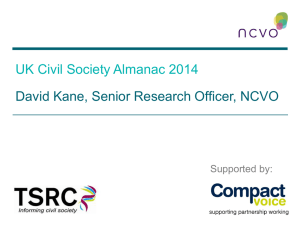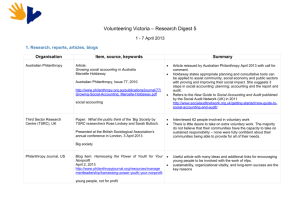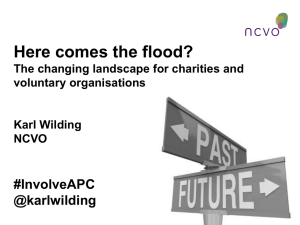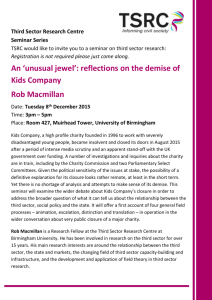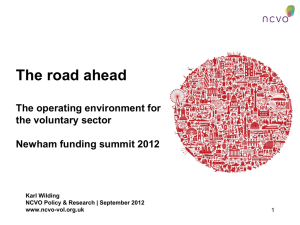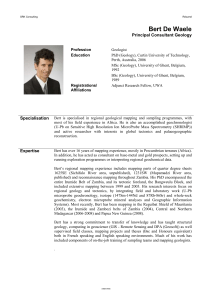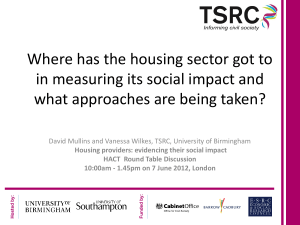Briefing Paper 1 - University of Birmingham
advertisement
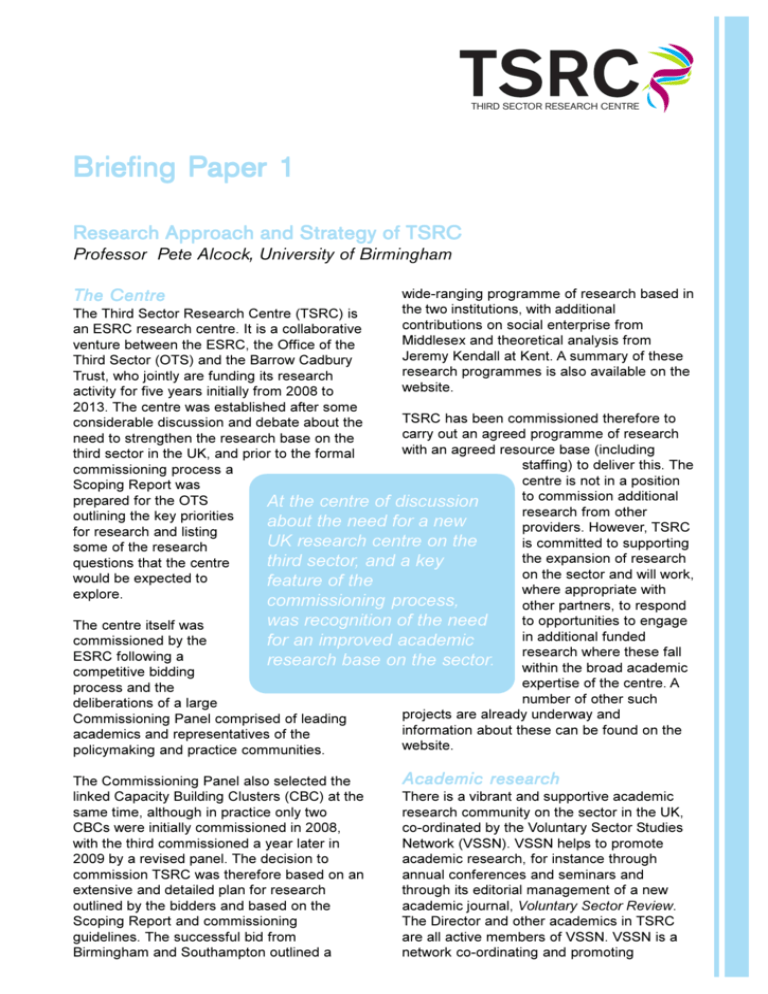
THIRD SECTOR RESEARCH CENTRE Briefing Paper 1 Research Approach and Strategy of TSRC Professor Pete Alcock, University of Birmingham The Centre wide-ranging programme of research based in the two institutions, with additional contributions on social enterprise from Middlesex and theoretical analysis from Jeremy Kendall at Kent. A summary of these research programmes is also available on the website. The Third Sector Research Centre (TSRC) is an ESRC research centre. It is a collaborative venture between the ESRC, the Office of the Third Sector (OTS) and the Barrow Cadbury Trust, who jointly are funding its research activity for five years initially from 2008 to 2013. The centre was established after some TSRC has been commissioned therefore to considerable discussion and debate about the carry out an agreed programme of research need to strengthen the research base on the with an agreed resource base (including third sector in the UK, and prior to the formal staffing) to deliver this. The commissioning process a centre is not in a position Scoping Report was to commission additional prepared for the OTS At the centre of discussion research from other outlining the key priorities about the need for a new providers. However, TSRC for research and listing UK research centre on the is committed to supporting some of the research the expansion of research third sector, and a key questions that the centre on the sector and will work, would be expected to feature of the where appropriate with explore. commissioning process, other partners, to respond to opportunities to engage was recognition of the need The centre itself was in additional funded commissioned by the for an improved academic research where these fall ESRC following a research base on the sector. within the broad academic competitive bidding expertise of the centre. A process and the number of other such deliberations of a large projects are already underway and Commissioning Panel comprised of leading information about these can be found on the academics and representatives of the website. policymaking and practice communities. The Commissioning Panel also selected the linked Capacity Building Clusters (CBC) at the same time, although in practice only two CBCs were initially commissioned in 2008, with the third commissioned a year later in 2009 by a revised panel. The decision to commission TSRC was therefore based on an extensive and detailed plan for research outlined by the bidders and based on the Scoping Report and commissioning guidelines. The successful bid from Birmingham and Southampton outlined a Academic research There is a vibrant and supportive academic research community on the sector in the UK, co-ordinated by the Voluntary Sector Studies Network (VSSN). VSSN helps to promote academic research, for instance through annual conferences and seminars and through its editorial management of a new academic journal, Voluntary Sector Review. The Director and other academics in TSRC are all active members of VSSN. VSSN is a network co-ordinating and promoting research, however; it is not a centre able to develop and deliver a co-ordinated research program. Such centres do exist in the US and in some countries in continental Europe. TSRC is in part a response to the need for such a centre in the UK. TSRC will work closely with VSSN and its members to promote academic research on the sector across the UK. Much of the existing third sector research had been funded by policy makers or practitioners to explore and assess the effectiveness of current policies and practices in the sector. Much of this is ‘evaluation research’, focused on independent evaluation of particular activities or initiatives. This work is useful and important for policy and practice, and can help to inform academic understanding. But it is inevitably limited in its scope and wider applicability. Independent academic research has been taking place too, of course, but much of this has also been relatively small scale and often time limited. TSRC must contribute to ensuring that difficult theoretical issues are articulated and explored – not the least what is perhaps the most controversial question of all: what is the third sector? Critical understanding of the policy environment it also essential, for it determines much of what happens within in the sector and is the focus of much debate by academics and practitioners. TSRC is cofunded by the OTS which is responsible for developing and delivering policy in England. The Centre’s research will help to inform policy development by OTS, but it will also make that policy process itself the subject of critical review, for instance an early priority will be work to analyse the impact of the recession on the policy process. Third we need to establish a comprehensive and robust database on the sector. One of the problems facing much previous research and policy making has been the lack of reliable data about the size, shape, structure and dynamics of the sector. Robust data is the core of any academic research endeavour, A key argument for establishing the centre and it is a core aim of TSRC to acquire such was therefore the need for a wide-ranging, data, to interrogate and analyse it, and to independent and long term make key features and programme of research findings available to and analysis. This is what research users. In time We do not want to ‘re-invent TSRC has been the Centre’s aim is to commissioned to provide, make access to data the wheel’; but equally a and this is what the sources available also, review of what we know will research programmes of providing protocols on help us to establish what we the centre focus on. ownership and anonymity do not know – or perhaps can be met. This will include quantitative data, First there is a need to what we do not understand. where Southampton will gather together what we We do need to know ‘what be providing the lead. We know from existing works’, but we also need to will use the Guidestar research, to identify database and other understand who decides strengths and gaps in this sources of statistics on and to make it available in ‘what matters’. the sector to establish a a more systematic form to comprehensive academics, policy makers, quantitative picture of the practitioners and other third sector in the UK, and will maintain and research users with an interest in the sector. enhance this over the course of the Centre to TSRC’s first priority is therefore a review of permit the longitudinal analysis of changes existing evidence and an ongoing over time. Previous research has not had the commitment to monitor this and make it resource base to establish such extensive available to users. data nor to engage in significant analysis of temporal change. The Centre will also Second it is essential that the Centre’s develop a new and extensive qualitative research is informed by a strong theoretical database, based on a large and diverse and conceptual analysis of the sector and the sample of case studies of third sector policy environment within which it is situated. organisations, led by Birmingham. These will Theoretical analysis of the sector is not well be recruited to represent the wide ranging developed in the UK, in part because of the diversity of third sector activity and will be applied focus of much existing research. tracked over four years initially. This will Economic analysis, seeking to use provide a unique resource of qualitative data economic models and measures to assess and will be a major methodological innovation the key features of the sector and the in research on voluntary contribution it makes to the action. The longitudinal economy and society. This dimension of this and the will include analysis of We will also deploy quantitative databases employment and sophisticated statistical will be a key feature of employment trends in the TSRC research, providing sector. It will also be techniques to provide a for the first time robust developed collaboratively fuller understanding of dynamic analysis of with related research in the patterns and dynamics of change both across the Centre for Market and the sector. Only a large sector and within Public Organisation individual organisations. (CMPO) at University of centre resourced over a These databases will be a Bristol. significant time period could major contribution to our Below the radar, which provide this longitudinal empirical knowledge of is the phrase we are using approach. the third sector; but they to describe the potentially will also be a resource for wide range of voluntary and addressing arange of community activity which is research questions about how the sector not captured by existing databases, public operates and what its impact is. registrations or major umbrella organisations. This will include the work of The fourth area of research for TSRC is small and community based organisations therefore analysis of the impact of the sector. working within vulnerable and marginalised This is potentially an extensive, if not infinite, communities, which is a particular concern focus for research, and inevitably therefore of the Barrow Cadbury Trust. the scope of research activity will be limited to Black and minority ethnic (BME) sector, some extent; and it is here where the we will undertake mapping and qualitative analysis to determine the extent to which evidence review and the engagement with there is a distinct BME subsector with a stakeholders (discussed below) can be particular focus on policy or practice. important in helping to identify appropriate and feasible research questions. However, there were clear questions identified in the Advice and engagement Scoping Report and the commissioning The research programmes of TSRC are thus process, and the Centre’s programmes set by the need to develop a robust and include some key streams of activity to extensive theoretical and empirical respond to these priorities. These research understanding of the third sector, and to make streams will have some flexibility to respond the findings from this available to a wide to changing priorities of policy and practice, range of research users. We are engaged in and so not all aspects of our work can be academic research and our key priority here covered in this summary. Key streams are is to ensure that our work is theoretically underway, however, and these include : informed and empirically robust. We also Social enterprise, led by Fergus Lyon at Middlesex, and exploring the extent to which social enterprise comprises a distinct part of the third sector with a distinct contribution to make. Service delivery, exploring in particular (though not exclusively) the expanding role of third sector organisations in the delivery of public services with public resources. This is a broad field where some existing research has already been undertaken. The focus of TSRC will therefore include some key areas of service delivery including, health and social care, housing, and criminal justice. want to ensure that this provides a resource for other academics and for policy makers and practitioners. It is important therefore that We need to know what are the key questions which policy makers and practitioners want research evidence on and what forms of evidence they think would be most useful to them to address these. our activity is carefully and rigorously constructed. Nevertheless it is also important that it is informed by the needs and concerns of policy makers and practitioners. It is for this reason that we have established an Advisory Board to oversee our research strategy, with representatives from sector agencies, academic research and policy providers. We have also established Reference Groups linked to each of our major streams of research, including a wider range of specialist advisors. These will meet regularly with researchers in these streams, and will work ‘virtually’ to advise and comment on our research. We also have established a Knowledge Exchange Team, based within NCVO in London, to ensure that our research engages with the widest range of stakeholders and research users from policy and practice, and in particular that our findings and analysis are made available and accessible to all. Devolved administrations The TSRC is a UK research Centre and our research and analysis will focus on the whole of the UK, although the OTS who co-fund the centre are an English government department. We will ensure that our policy analysis and quantitative data explore the different dimensions of third sector policy and activity across the four nations of the UK. Our qualitative work will be focused in England only however. We will establish separate Reference Groups to advise on the different context and structure of the third sector in Scotland, Wales and Northern Ireland. We will also discuss with the devolved administrations the scope for additional funding to undertake separate work in each of these countries, either to provide comparative analysis to research already underway in England or to meet the specific needs of policy makers or practitioners in the devolved administrations. We have recruited academic leads in each country, who will act as associate directors for the additional research activity developed through TSRC in these countries, and will coordinate the work of academic researchers in each country to deliver this. Looking forward… The long term aim for TSRC is to establish a permanent centre for academic research on the third sector in the UK. We want to be able to maintain our core data gathering and analysis as a sustainable resource for all research users. Over time we will also be able to develop analysis to address a wider range of developing research questions. This will also include securing funding for additional, and more applied research which can draw on TSRC data and expertise to meet the needs of different policy and practice agencies and research communities – indeed we are already engaged in a number of separately funded projects to do this, details of which will be available on the website in due course. We are also committed to promoting and supporting the building of capacity for research with, on and for the sector. In part this will be achieved by our joint work with the three Capacity Building Clusters. In part it will be achieved through our collaboration with related ESRC or OTS investments, notably the Centre for Charitable Giving and Philanthropy (CGAP) and the Centre for Market and Public Organisation (CMPO). But in part it will also be a feature of our activity within the Centre to promote and support the work of other researchers both in the academic and practice communities, for instance, through online advice, training courses, and honorary and visiting fellowship programmes. Finally we are concerned to ensure that our research has a real impact on policy and practice. We will facilitate engagement and dissemination, in particular through the work of our Knowledge and Exchange Team; but we will also use this engagement to develop evaluation of the impact of our research over time. We want to ensure that a sustainable research centre is also a valuable and influential one. This paper is part of the Third Sector Research Centre – Briefing Paper Series see www.tsrc.ac.uk for more details and a copy of the full Working Paper 1. The support of the Economic and Social Research Council (ESRC), the Office of the Third Sector (OTS) and the Barrow Cadbury UK Trust is gratefully acknowledged. The work was part of the programme of the joint ESRC, OTS Barrow Cadbury Third Sector Research Centre
